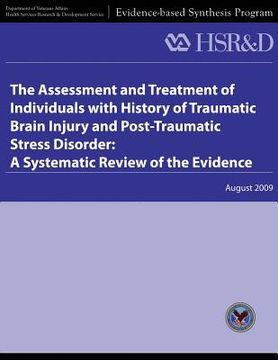The Assessment and Treatment of Individuals With History of Traumatic Brain Injury and Post-Traumatic Stress Disorder: A Systematic Review of the Evid (en Inglés)
Reseña del libro "The Assessment and Treatment of Individuals With History of Traumatic Brain Injury and Post-Traumatic Stress Disorder: A Systematic Review of the Evid (en Inglés)"
Traumatic brain injury (TBI) has been defined as trauma to the head that results in a decreased level of consciousness, amnesia, other neurologic or neuropsychologic abnormalities, skull fractures, intracranial lesions, or death. TBI can be caused by penetrating trauma or by blunt force, including acceleration/deceleration forces that cause the brain to collide with the skull. Blunt force TBI is typically classified by level of severity, most commonly differentiated as mild, moderate, or severe. The vast majority of civilian patients that are hospitalized for TBI are diagnosed with mild TBI (mTBI). While a similar ratio specific to soldiers or veterans is not readily available, mTBI is also prevalent in this population. Personnel engaged in the current military operations, Operation Enduring Freedom and Operation Iraqi Freedom (OEF/OIF), are sustaining mTBI at unprecedented rates. One commonly referenced report estimated that nearly 20%, or 300,000, OEF/OIF veterans had sustained a TBI during deployment, many of these being mTBI. There has been much political and media interest in the rates of mTBI associated with the current conflicts. While most of those who sustain mTBI do not experience ongoing symptoms, a minority of individuals will experience some psychosocial, mental, and/or physical health problems. Thus, there is major concern across veteran healthcare providers, particularly the U.S. Department of Veterans Affairs (VA) and Department of Defense (DoD), regarding the identification and care of mTBI. Post-traumatic stress disorder (PTSD) is a highly prevalent and pernicious mental health problem with significant costs to the individual and society. It is an anxiety disorder characterized by avoidance behaviors, physiological hyperarousal, and re-experiencing symptoms following exposure to a traumatic event. VA and DoD healthcare providers are now facing a large population of OEF/OIF veterans who have sustained TBI, particularly mTBI, and also suffer from PTSD. However, the long-term health outcomes of individuals who have received diagnoses of both TBI and PTSD (TBI/ PTSD), especially mTBI and PTSD (mTBI/PTSD), are poorly understood. There is concern that current evidence-based practices to define, identify, and treat mTBI and PTSD may be less accurate and/or effective when the conditions co-occur. Thus, there is a need to develop an evidence base and identify best practices for patients with this co-diagnosis. The objective of this evidence synthesis report was to systematically review and summarize the published literature that addresses the epidemiology, assessment, and treatment of adults with mTBI/PTSD. While the epidemiologic review compares prevalence estimates of PTSD across all TBI severity levels, so as to examine any potential differences in prevalence by TBI severity, the assessment and treatment sections of this report were focused on mTBI because of the growing concerns related to this injury in the U.S. military population. We emphasized results most relevant to U.S. military personnel and veterans. We conducted a systematic literature review to address the following key questions: 1) What is the prevalence of comorbid TBI and PTSD? Does the reported prevalence vary by study population, trauma etiology, TBI severity (mild versus moderate and severe), or methods of case ascertainment? 2a) What is the relative accuracy of diagnostic tests used for assessing mTBI when mTBI is comorbid with PTSD? 2b) What is the relative accuracy of diagnostic tests used for assessing PTSD when PTSD is comorbid with mTBI? 3a) Are there psychosocial or pharmacological therapies used for treatment of mTBI and PTSD simultaneously? 3b) Are therapies for treatment of mTBI effective when mTBI is comorbid with PTSD? Is there evidence of harms? 3c) Are therapies for treatment of PTSD effective when PTSD is comorbid with mTBI? Is there evidence of harms?

